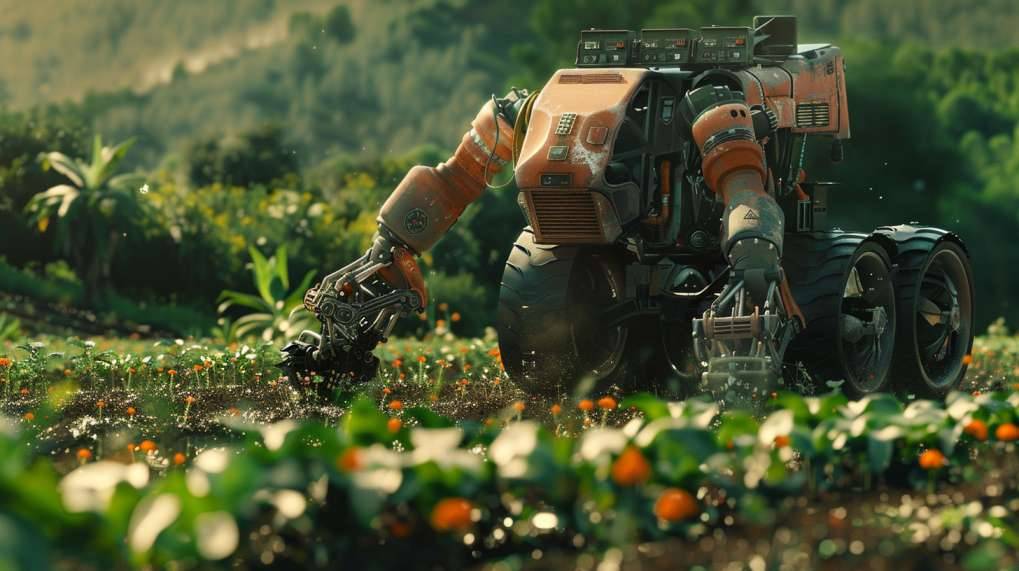
Agriculture is undergoing a remarkable transformation into a high-tech industry, attracting fresh talent, new ventures, and substantial investments. Rapid technological advancements are not only enhancing farmers' production capacities but also revolutionizing robotics and automation.
Central to this evolution is the urgent need for significantly higher production yields. The UN estimates that by 2050, there will be 9.8 billion people on the planet, up from the current 8.1 billion, and that would result in a sharp increase in food consumption and tremendous pressure on farmers to supply it.
Understanding Agricultural Robots:
In recent years, agricultural robots, commonly known as agri-robots or agribots, have emerged as game-changers in the agriculture sector. By automating various tasks, these cutting-edge technologies are transforming traditional agricultural techniques and improving the sector's sustainability, efficiency, and output.
Agricultural robots are playing a crucial role in boosting production yields through various means. From the utilization of drones for aerial surveillance to the deployment of autonomous tractors and robotic arms, innovative applications of technology are transforming farming practices. Lets explore more about agricultural robots. Read On
Types of Agricultural Robots:
1. Autonomous Tractors and Machinery:
Autonomous tractors equipped with cutting-edge technologies such as GPS, sensors, and navigation systems are transforming farming practices. These intelligent machines can efficiently perform tasks like ploughing, seeding, and harvesting with unparalleled precision. Additionally, smart machinery and implements, including planters, sprayers, and harvesters, are designed to operate autonomously or with minimal human intervention, thereby reducing labour costs and increasing efficiency.
2. Unmanned Aerial Vehicles (UAVs) and Drones:
UAVs and drones equipped with advanced cameras, sensors, and imaging technologies are revolutionizing crop monitoring and surveillance. These aerial vehicles enable farmers to obtain real-time insights into crop health, pest infestations, and environmental conditions. Drones enable farmers to make well-informed decisions, which in turn improves crop yields and resource management by enabling early identification and intervention.
3. Robotic Harvesters and Pickers:
Robotic harvesters represent a significant advancement in the agricultural industry, particularly in sectors like fruit and vegetable farming. These robots are equipped with sophisticated vision systems, robotic arms, and grippers, enabling them to selectively pick ripe produce while minimizing damage to crops. Robotic pickers ensure higher-quality yields, increase productivity and lessen manpower dependency by optimizing the harvesting process.
4. Weed Control Robots:
Weed control robots leverage various methods, including mechanical weeding, thermal treatment, and precision herbicide application, to manage weed infestations effectively. These robots are designed to navigate through crop rows, identify weeds, and administer targeted treatments, thus minimizing the reliance on herbicides and manual labour. These robots support both farm profitability and environmental conservation by endorsing sustainable weed management techniques.
5. Soil Monitoring & Cultivation Robots
Soil monitoring robots equipped with advanced sensors and probes play a crucial role in optimizing soil health and fertility. These robots assess key soil parameters such as moisture levels, nutrient content, and pH, providing farmers with valuable insights for precision agriculture. Additionally, cultivation robots, including robotic tillers and weeders, aid in soil preparation and cultivation tasks, ensuring optimal conditions for crop growth and yield.
Benefits of Agricultural Robots:
1. Labour Savings
Agricultural robots alleviate the burden of repetitive and physically demanding tasks, thus reducing the dependency on manual labour. These robots help farmers deploy human resources more strategically by automating routine tasks and concentrating on those that call for creativity and judgment. Moreover, labour-saving technologies mitigate the impact of labour shortages, ensuring uninterrupted farm operations.
2. Increased Efficiency
Agricultural robots' accuracy and reliability result in increased operating efficiency for a variety of farming tasks. These robots maximize yields, eliminate input waste, and optimize resource use through the use of autonomous navigation and real-time data processing. As a result, farmers can achieve higher productivity levels while reducing production costs and environmental footprints.
3. Improved Crop Quality
Robotic harvesting and picking technologies ensure gentle handling of crops, preserving their quality and freshness throughout the harvesting process. The ability of robots to selectively harvest ripe produce minimizes post-harvest losses and enhances overall crop quality. By delivering undamaged and premium-quality yields, agricultural robots contribute to customer satisfaction and market competitiveness.
4. Enhanced Sustainability
Agricultural robots play a crucial role in promoting sustainable farming practices by reducing reliance on chemical inputs and minimizing environmental impact. Through targeted and precise application of resources, including water, fertilizers, and pesticides, these robots optimize resource usage while minimizing waste. Agricultural robots also contribute to the long-term sustainability of agricultural ecosystems by reducing soil erosion and compaction. This helps maintain the fertility and health of the soil.
With ongoing advancements and innovations, agricultural robots are poised to revolutionize farming practices and ensure food security for future generations.
(Information is taken from the ICAR report titled Revolutionizing Agriculture: The Digital Transformation of Farming)

















